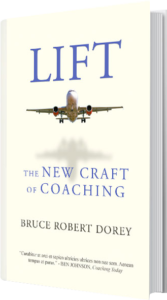The New Craft of Coaching, opens the mind to the rich harvest for the taking if only young professionals were willing to embrace an elaborate and patient approach of apprenticeship under masters of the craft.


Bruce Dorey
Book Review by Surendar Balakrishnan
Saying that most instances of transformation in technology or business process are just changes, leading to mediocre or substandard results in business, Bruce Dorey, in his book, LIFT: The New Craft of Coaching, opens the mind to the rich harvest for the taking if only young professionals were willing to embrace an elaborate and patient approach of apprenticeship under masters of the craft. Such an approach, he argues, would give them tools and hone their mental faculty to undertake even the most complex of tasks and effectively face even the most trying of circumstances.
At one level, the book is a nuanced questioning of the intrinsic value of structured, packaged leadership training courses. Dorey argues that such courses are inadequate and that they simply cannot replace the approach of putting in the hard yards under the watchful gaze of a master till young professionals, one day, gain mastery over their craft.
Dorey, who for many years, plied his trade as an engineer in the HVACR industry in the Middle East, speaks of the inestimable value of metis, a Latin word that encompasses “the hard-learned competencies of working alone, with groups of people, and, increasingly, with technology”. He says it makes thorough sense to learn from the embedded knowledge and metis of masters by “applying our minds and bodies to the task in an apprentice-journeyman-master model”. He calls for the transfer of metis to the next generation, so that it is not lost with the inevitable retirement of the masters. He says there is a need for a good method to hand over the controls to the next generation and adds that the book offers an effective process.
The book perhaps is relevant in the present circumstances in the Middle East, dominated by fluctuating oil prices and their impact on projects in the pipeline. Economic circumstances have also persuaded many developers, architects and general contractors to look for cost-effective options in the MEP consultancy and contracting industries. This has encouraged an influx of young and often inexperienced professionals, who are only too happy to accept assignments for a lower price. Instances abound of new professionals soon discovering the financial non-viability of executing the projects and of eventually abandoning them, which has forced suppliers of equipment to face uncertainty over ever recovering payments due to them. In that context, there is perhaps a role for government policy-makers to tighten the process and mandate a system of apprenticeship in engineering and business matters, as a precursor to awarding licences to new consultants and contractors.
The reviewer is Co-Founder & Editorial Director of CPI Industry. He can be contacted at surendar@cpi-industry.com
Copyright © 2006-2025 - CPI Industry. All rights reserved.